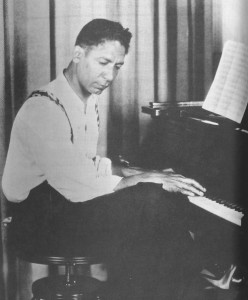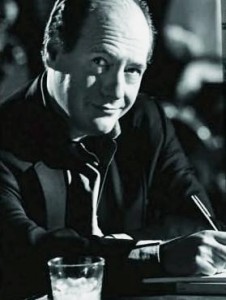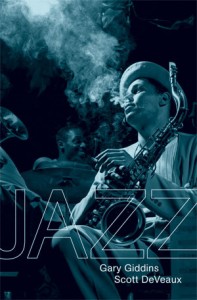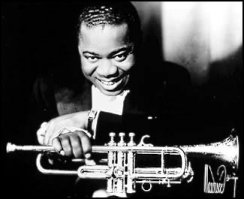Film critic Richard Schickel wrote in the Los Angeles Times:“We see our culture more clearly because of [Gary Giddins’s] force, intelligence and alertness to overlooked detail.”
From 1973—2003 Gary Giddins wrote his "Weather Bird" column for New York's Village Voice, earning himself international recognition and numerous awards. One of the most celebrated authors in jazz, Giddins has repeatedly won the ASCAP Deems-Taylor Award in music criticism. He is a multi-year winner of the Jazz Writer of the Year award from the Jazz Journalists Association and a recipient of the group's Lifetime Achievement award. In 2002 he won the Ralph J. Gleason Music Book Award for his insightful biography, Bing Crosby: A Pocketful of Dreams. And in 2001 he appeared in frequent on-camera interviews in Ken Burns' PBS series, Jazz.
This week Gary Giddins is our guest on a special edition of Riverwalk Jazz, and he talks with host David Holt about his most recent book titled Jazz. In a far-ranging conversation, Giddins touches on his idea of how jazz has been a living presence in our culture, both influencing and being influenced by its people and history. He talks in detail about pieces of music he finds especially compelling in early jazz, including King Oliver's "Snake Rag," Jelly Roll Morton's "Dead Man Blues" and Louis Armstrong and Bessie Smith's duet on "Reckless Blues."
A native of Brooklyn, New York, Gary has taught at Columbia University, the University of Pennsylvania, Rutgers, and New York University. Currently he teaches at the Graduate Center, City University of New York and writes columns about music for Jazz Times and about film for the New York Sun. He is at work completing the eagerly anticipated final volume of his Bing Crosby biography.
Giddins' life-long interest in jazz is unabashedly passionate; he notes, "...I write about jazz because Louis Armstrong’s 1938 'Jubilee,' which ought to be included in any universal health-care system, is too good a secret to keep."
In 2009 Gary Giddins and co-author Scott DeVeaux completed six years of work on their sweeping, all-inclusive history, simply titled Jazz, published recently by W.W. Norton. This week's broadcast touches on only a small fraction of the territory covered in their encyclopedic work which often reads like an engrossing novel. Giddins' conversation with Holt is shaped around four figures of pre-war jazz familiar to regular listeners of our radio series. Cornetist Jim Cullum and the Band give their interpretations of classic tunes from this recorded legacy.
Joe 'King' Oliver perfected the art of the jazz ensemble, where all of the horn voices play simultaneously in a massed improvisation. Although his career was cut short by gum disease and poor business judgment, his music influenced Bix Beiderbecke, Duke Ellington and Louis Armstrong. Speaking with Holt, Giddins says, "...the thing about Oliver that is so stunning to us even now in the 21st Century is that at its best, I think, it’s fair to say flawless ensemble music."

Jelly Roll Morton, 1926 recording session. Photo courtesy Frank Driggs, from Jazz, by Gary Giddins and Scott DeVeaux.
Jelly Roll Morton was the first great composer of jazz. His 1927 Red Hot Peppers recordings for Victor are widely regarded as classics of the New Orleans genre. In his Riverwalk interview Giddins remarks, "...one of the things that I love about Morton is that even though he’s one of the first guys to leave New Orleans and travel around the country, he’s really the Poet Emeritus of New Orleans because he never leaves that music behind."
Bessie Smith, known as the "Empress of the Blues," led a hard life performing on the road in vaudeville and tent shows in the South. She possessed the most heroic of all the voices of classic blues. On this week's broadcast Giddins talks about the interplay between Bessie and Louis Armstrong on "Reckless Blues." "Here it’s in its purest form...you have the feeling that you’re listening to history being made, music being discovered, an art coming into its own."
One of Louis Armstrong's great contributions to jazz of the 1920s was to infuse blues feeling and approach to tonality—the "bent" or sliding "blue notes"—into the jazz that was being played in New York by Fletcher Henderson, Duke Ellington and others.
As Giddins sums up on this week's show: "Armstrong almost single-handedly made everyone realize that the blues is the most profound foundation in American music and it would remain the foundation for everything that followed, rhythm and blues, swing, bebop, rock and roll, you name it. It’s still there."
Photo credit for Home Page: Special guest, award-winning author Gary Giddins. Photo courtesy independent.co.uk.
Text based on Riverwalk Jazz script by Margaret Moos Pick ©2012





